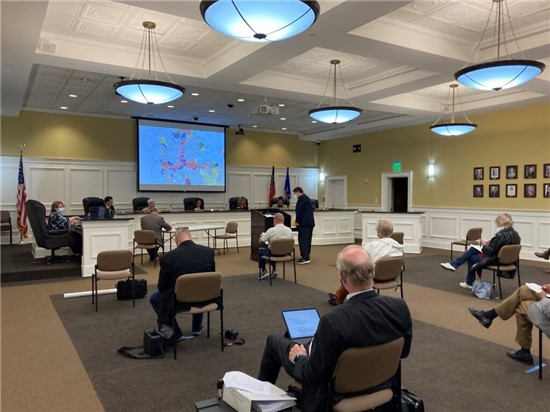 SNELLVILLE — In a unanimous show of support, Snellville's City Council brought four years of community input, idea testing and draft review to an end with their Monday, October 26 adoption of the Unified Development Ordinance, a comprehensive updating and consolidation of the city's existing zoning and development regulations.
SNELLVILLE — In a unanimous show of support, Snellville's City Council brought four years of community input, idea testing and draft review to an end with their Monday, October 26 adoption of the Unified Development Ordinance, a comprehensive updating and consolidation of the city's existing zoning and development regulations.
Reinforcing support voiced by Councilmember Tod Warner during the meeting, Snellville Director of Planning and Development Jason Thompson summed up the experience: "We took the time to get it right. As a result, we're no longer facing modern growth and development challenges with yesterday's tools."
"Under the UDO, we've cleaned up and simplified everything, increased flexibility, and enabled the kind of redevelopment — like our Towne Center plan — envisioned by the community," he said.
View the adopted code here.
A broad and comprehensive process
Early in 2016, at the direction of Mayor and Council, the City of Snellville and its consultant team began work on the Unified Development Ordinance (UDO).
Foundational direction for the project was obtained through a series of one-on-one interviews, focus groups and a widely attended Towne Center gathering, where a broad cross section of the community — residents and neighborhood groups, builders and developers, members of the city's faith communities and small business owners and entrepreneurs — made their priorities known.
Those priorities reflected a desire to preserve and build upon Snellville's enviable quality of life and touched on everything from what's built to where it's built to how it's built. Collectively, they expressed a need for a modern and user-friendly code that fosters quality redevelopment, promotes innovation, effectively manages stormwater, enables the city's Towne Center, and cultivates better design.
That input was then shared with the community in a full-house meeting to be validated and fine-tuned. Many were particularly interested in how the new code could ensure that the city's long-desired Towne Center gets built as envisioned.
"Most development on the horizon will come in the form of redevelopment — rebuilding on previously developed sites," responded project lead Caleb Racicot of TSW Planners at the time. "That's a whole different game and requires a different set of rules if you want to win."
Accordingly, the city then turned its attention towards enacting two new custom zoning districts supporting future Towne Center development, ensuring proactive support of that long-sought community project and allowing for the testing of design standards that might have future citywide applications.
Ultimately, Phase One community input, as well as the resulting analysis from the consultant team, was summarized in the Diagnostic Report that, according to Racicot, became the "blueprint that told us, the code writers, what was important to the city of Snellville and how it should be incorporated into the UDO."
Testing the community's vision
As the new Towne Center zoning districts became finalized and plans were moving forward, Georgia's state-mandated requirement to update the city's comprehensive plan was fast approaching.
Rather than orchestrate both the UDO and the comprehensive plan at the same time, city officials and the consultant team seized the opportunity to delay the UDO until the comprehensive planning process was complete — allowing its extensive community visioning and engagement efforts to be incorporated back into the UDO.
As a result, the UDO adopted Monday evening is optimized to ensure that the community's expressed ambitions through 2040 are supported by regulations that enable them.
Time well spent
Though the Unified Development Ordinance project exceeded its original timeline — as high priority community goals, a state mandated project, and a global pandemic intervened in unexpected ways — the delays only served to strengthen the emerging "renovation" through increased public discussion of community priorities and concerns, and real-world testing of walkable and mixed-use standards.